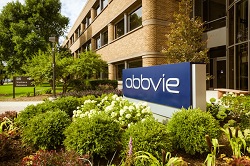 |
| Courtesy of AbbVie |
While AbbVie ($ABBV) is widely expected to be the second entrant to the soon-to-explode market for hepatitis C cocktail drugs after standard-bearer Gilead Sciences ($GILD), promising data from latecomer Merck ($MRK) have analysts relegating the Illinois company to third place despite some excellent late-stage results.
At this week's International Liver Congress in London, AbbVie is trumpeting stellar Phase III results from its three-drug combination, which posted 12-week cure rates upward of 96% in patients with hard-to-treat genotype 1 hep C and in those who've already failed to derive a benefit from previous treatment. The results, published in The New England Journal of Medicine, are part of AbbVie's expansive late-stage program in which it tracked more than 2,300 patients, and the data will support an application for FDA approval expected this quarter.
If all goes according to plan, AbbVie will hit the market just a few months behind Gilead Sciences, which in February submitted an FDA app for a hep C cocktail that combines its blockbuster Sovaldi with the NS5A inhibitor ledipasvir.
But despite AbbVie's promising late-stage results and substantial head start, analysts now expect late entrant Merck to snag second place in the multibillion-dollar market with its Phase II combination of the antivirals MK-5172 and MK-8742. In mid-stage results unveiled at the same conference, Merck's all-oral cocktail posted a 12-week cure rate of 98% in genotype 1 patients, leading ISI's Mark Schoenebaum to speculate that peak estimates for the drug could rise as high as $3.2 billion and Citi analyst Yaron Werber to pencil the company in for an eventual second-place spot behind Gilead.
Merck's apparent leapfrogging is in part due to convenience: Like Gilead's fixed-dose combo, the MK-5172/MK-8742 cocktail is a once-a-day treatment. AbbVie's drug, on the other hand, uses three antiviral agents: ABT-267, ABT-333 and ABT-450/ritonavir, which was developed alongside partner Enanta Pharmaceuticals ($ENTA). Those overlapping mechanisms of action are exactly what disrupt hep C's replication process, but they require patients to handle multiple pills each day.
All that said, with efficacy fairly similar across all the players in the next generation of hep C treatments, the largest market share may go to the winner of a looming price war. Payers, patients and physicians have all decried Gilead's $1,000-a-pill hegemony with Sovaldi, and analysts expect Merck, AbbVie and fourth-place Bristol-Myers Squibb ($BMY) to get aggressive on pricing, driving down the cost of care and giving each a puncher's chance at leading the market.
- read the release